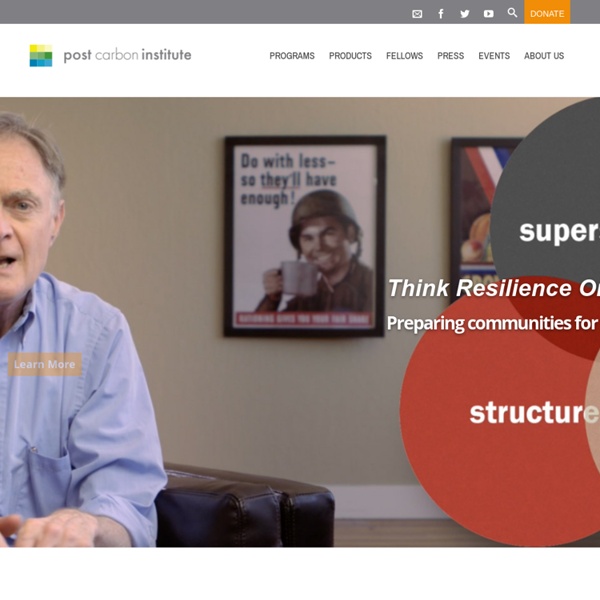



E. F. Schumacher Ernst Friedrich "Fritz" Schumacher (16 August 1911 – 4 September 1977) was an internationally influential economic thinker, statistician and economist in Britain, serving as Chief Economic Advisor to the UK National Coal Board for two decades.[1] His ideas became popularized in much of the English-speaking world during the 1970s. He is best known for his critique of Western economies and his proposals for human-scale, decentralized and appropriate technologies. According to The Times Literary Supplement, his 1973 book Small Is Beautiful: a study of economics as if people mattered is among the 100 most influential books published since World War II,[2] and was soon translated into many languages, bringing him international fame. The 25 Hottest Sustainability Professionals Marks & Spencer’s Plan A is Hot Hottest lists, are well, hot. So I thought I would start April with a list of the hottest 25 sustainability professionals. After all, sustainability is HOT–but the best way to comprise a list of sustainability stars is to focus on brains, compassion, dedication, impact and of course, more brains. We won’t wade into the spit-spat between Complex Magazine and Pando Daily, which recently issued some top 40 lists of the hottest tech professionals–again, this list is focused on intellect and results.
Nocookies You have cookies turned off To use this website, cookies must be enabled in your browser. To enable cookies, follow the instructions for your browser below. Facebook App: Open links in External Browser Oil Spill Disaster on New Zealand Shoreline - Alan Taylor - In Focus Nine days ago, a Liberian-flagged container ship called the Rena ran aground on Astrolabe Reef, 14 miles offshore from Tauranga Harbor on New Zealand's North Island. In addition to the 2,100 containers aboard, the Rena was carrying 1,700 tons of fuel oil and another 200 tons of diesel fuel. A cracked hull and rough seas have dislodged more than 80 containers and spilled some 300 tons of oil already, fouling Tauranga beaches and reportedly killing some 1,000 birds so far.
Upcycling Upcycling, also known as creative reuse, is the process of transforming by-products, waste materials, useless, or unwanted products into new materials or products of better quality or for better environmental value. Upcycling is the opposite of downcycling, which is the other face of the recycling process. Downcycling involves converting materials and products into new materials of lesser quality.
theaustralian.com CQR books healthy profit The Charter Hall Retail REIT has posted a healthy first-half result as its focus remains on larger convenience-orientated malls. Qantas warns on foreign access Qantas has warned politicians against any move to let foreign-owned international airlines fly Australian domestic routes.
Save Our Earth : Its an Illusion by John Harris. Please read each and everyone of you, this is so important What you are about to read may at first confuse some of you, some may not believe and some will be shocked. What you are about to read is truth and I urge you all to stay and read all this information and understand it because it concerns you and it concerns your children and all your property. Lawful Rebellion The British Constitution Group Opower Opower connects with utilities Opower connects with energy companies to automagically pull in your usage so that you can easily compare, compete, and discover. Currently participating utilities include: Investors bet on bad weather IBM’s new ad campaign features a jumble of corporate jargon—there are boasts of “a cloud platform built enterprise-strong” — next to a multiethnic array of models, each meant to represent a particular profession. A banker tops the page. Next to his face, it reads, “I can turn weather and tweets into high-yield returns.” IBM computers can sort through data — from tweets to temperature readings — to help investors make decisions.
From toxicity to life: arsenic proves to be a building block LLNL's Jennifer Pett-Ridge, right, runs the NanoSIMS and analyzes some arsenic-grown cells from Mono Lake as NASA/USGS's Felisa Wolfe-Simon observes. High Resolution Image LIVERMORE, Calif. - Arsenic -- an element that triggers death for most Earthly life forms -- is actually allowing for bacterium to thrive and reproduce. In a study that may prompt the rewriting of textbooks, a team of astrobiologists and chemists has found the first known living organism that can use arsenic in place of phosphorus in its major macromolecules. The new findings, published in the Dec. 2 issue of Science Express, could redefine origins of life research and alter the way we describe life as we know it.
Plastic Pollution Coalition The Recycling Myth Collecting plastics at curbside fosters the belief that, like aluminum and glass, these will be converted into new similar objects. This is not the case with plastic. The best we can hope for plastics is that these will be turned into other products such as doormats, textiles, plastic lumber, etc. These products will still end at some point in the landfill – and do not stem the need for more virgin petroleum product.